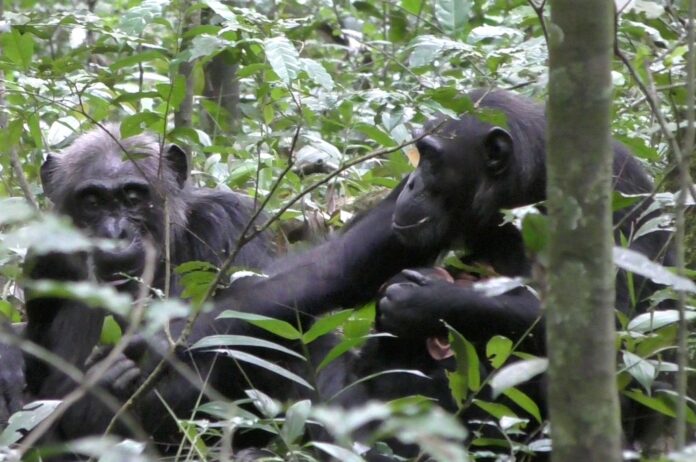“A uniquely human trait” that was previously believed to be exclusive to humans was recorded in a wild chimp.
The result shows that, under particular social situations, chimpanzees in the wild can communicate experiences with one another using gestures to comment or make observations about the world.
In the first year of life, humans make referential gestures to show or point out objects or events of interest to others, but primates have never been recorded doing this. All previously documented referential gestures in primates were used to request something.
“People love sharing experiences with each other – social media capitalises on this trait, and even in our first year of life we start to show others interesting things we’ve found,” explains lead author Dr. Claudia Wilke from the University of York.
“It has been suggested that ‘sharing for sharing’s sake’ is a uniquely human trait, but our observation of these wild chimpanzees challenges this. We observed an adult chimpanzee showing her mother a leaf she had been grooming, not because she wanted her to do anything with the leaf, but most likely because she simply wanted her to also look at the leaf.”
New observations, according to co-author Somon Townsend, “suggest that in specific social circumstances chimps may show each other objects of interest, to share attention about them, and that this behaviour may not be unique to humans.”
In the Kibale Forest in Uganda, the researchers were able to acquire video evidence of an adult female chimpanzee named Fiona showing a leaf to her mother named Sutherland.
They looked at more than 80 similar leaf-grooming events to rule out other possible reasons for the behavior, such as sharing food or beginning to play or grooming.
Next, the team plans to study chimpanzee communities to see whether they can find evidence of this showing and sharing behavior among the animals.
Researchers believe their findings could shed light on the origins of social cognition and the special qualities of the human mind.
“While there is a need to identify further examples of this behaviour in chimpanzees, our observations indicate that sharing attention for sharing’s sake is not unique to humans,” adds co-author Professor Slocombe.
“It has been argued that our ability to share experiences helped us to evolve the cognitive abilities that set us apart from other species, such as our capacity for joint action, cooperation and language.
“Our observations raise new questions about why humans share experiences more often than our closest living relatives and whether engaging in this behaviour at a higher frequency than other species can still explain the evolution of cognitive functions underpinning human social behaviour.”
Image /Video Credit: Dr Claudia Wilke, University of York
